To help celebrate I made this very brief (22 secs) video of some Cherrie's Tanagers.
All sorts of Tanagers are very common in our yard.
These Cherrie's Tanagers were in the palm tree next to my office window.
[leadplayer_vid id="56C8F29D20239"]
I get constant delight out of the bird life in Panama.
And so many other birds. I live much closer to nature here than I did in the States.
It isn't just birds. I watch iguanas from my living room, I see numerous toads, and a wide array of interesting looking caterpillars, butterflies, moths, and more.
Of and I cannot forget to mention geckos. They are nature in your house! I love watching them - plus they eat insects. I will have to do a video on them in the future.
I love living in nature here in Panama.
Do you have any thoughts to add on this topic?
January 14, 2016
Photo taken in Boquete, but not at the flower festival. We'll be going for the 1st time this yearThe festival is a huge celebration. Thousands of people flock to Boquete to see it.
So don't expect to get a last minute hotel reservations. People reserve rooms months in advance. However, you may be able to find a hotel room about 30 minutes away in David.
I must admit that so far the crowds have always kept us away from the festival.
But this year we are going! I am looking forward to it. I will write up our review of the festival once we go.
Now that our younger daughter, Blaise, is getting older, it is easier & more fun to go to these bigger event. (She is now 9 years old.) Blaise tolerated our participation in the Boquete Jazz festival last year. But I think she will enjoy this festival much more. Not only does she love flowers, but there are amusement rides and more vendors of both food and crafts.
BTW the Boquete Jazz festival is February 25-28 this year. To learn more about Jazz festival, read about our visit to the 2015 Boquete Jazz festival.
I hear that during the 10-day flower and coffee celebration, the Boquete fairgrounds overflows with lush fill landscaping and flower displays. People spruce up their own gardens as well. You also get many opportunities to enjoy a cup of local coffee. And there are many food stands, live music, amusement rides, handicrafts booths, and more.
If you miss the festival, you can still see the flower displays thru April. You can get in to see them for only $1.
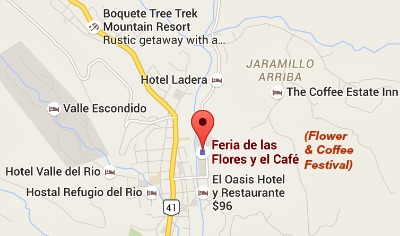
The flower fair is located at Boquete's fairgrounds along the Caldera River, near downtown Boquete.
Also, in mid-April, Boquete holds the same kind of festival, but much smaller. This one is the Orchid Festival (Feria de Orquídeas). It last for 4 days. Many orchids bloom in April, so it is an ideal time for local orchid growers to show off their orchids.
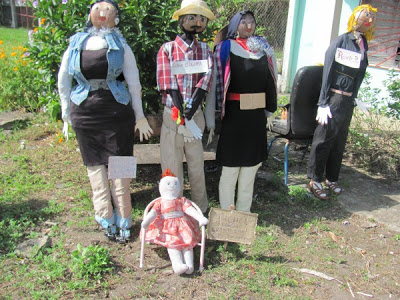
People carefully consider how to greet the new year here.
My guess is that many Panamanians, and others around the world, will greet the Year on the dance floor with a glass in hand. Not a bad way start to 2016.
I love to travel. Luckily for me, my family and I will be in an airport at midnight on New Year's Eve.
Read about the many New Year customs and traditions in Panama here. Many are quite unusual, like the one in the photo above.
New Year’s Eve is an big event in Panama.
Everyone is in great spirits and ready to party!
If you will be in Panama for New Year's Eve, you also need to plan ahead.
Often for big holidays you can not buy alcohol in grocery stores for a specific period of time. I'm not sure that will happen on New Year's eve, but it is worth asking about before New Year's Eve. But you can always go to a bar, of course.
December 10, 2015
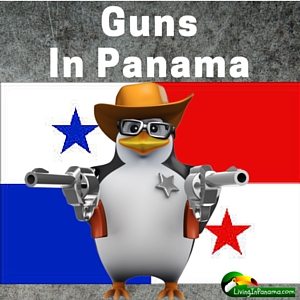
Never smuggle a gun into Panama. Always declare your gun if going through customs. The jail time in Panama for having a gun with no permit is big and automatic - no ifs, ands, or buts allowed.
(scroll down for a story about a former police chief who didn't have a permit)
You need the following to qualify for a gun permit in Panama.
It takes about 3 - 6 months to get a gun permit.
Because of these requirements, you won’t find your gardener or the average guy carrying a gun in Panama.
If you are buying the gun in Panama, the gun shop owner will know, and initiate, the process. You will need to show him or her your residency visa. You will also pee in a cup there (your urine sample) and get the form & info on getting your blood test. The shop owner will send all the paperwork to the police department.
More than one gun can be bought at the same time and go through the permitting process. There is no limit to the number of guns you can buy.
Guns cost about 50% more in Panama than in the States. However, importing guns is a huge pain in the neck. You might want to save yourself the grief and buy your guns in Panama.
To import your guns, you also start at a Panama gun shop. They will help you apply for an importation permit. You may need to enlist the help of licensed gun dealer to export your guns as well. You need to check with your country of origin to find that out.
The importation permit process is similar to the gun permit process. Also you will need to ship, by Fed Ex or such, your unloaded gun and all your paperwork from both countries to Panama. Then the wait begins.
Your guns will be stored in a non-climate controlled, rust-inducing, government warehouse somewhere in Panama. You need to pay an import duty based on the value of the gun, which can be steep. You may need to hire a custom broker to get you through the process.
You may want to skip this entire process and buy a gun in Panama. If you really must have a gun, that is.
Only the USA, Czech Republic & Switzerland are better to gun owners, according to Guns & Ammo.
Panama is very safe.
The Pinkerton Intelligence Agency has given Panama the highest rating for tourist safety. You are very unlikely to ever need a gun to defend yourself or your loved ones in Panama.
A gun permit in Panama automatically includes permission to carry a concealed gun.
In fact, if you carry a gun in Panama, it MUST be concealed.
You are not allowed to take a gun (concealed or otherwise) into banks, bars, nightclubs, and certain other financial or government buildings.
Surprisingly, you can take a gun to the airport in Panama. You must declare your gun to a security guard and give him a copy of the permit for that gun. The guard will take the gun to your airline to be shipped. You then pick it up when you get to your destination. Of course, you may want to check out the firearms rules at your destination airport.
You cannot own any fully automatic firearms.
You can buy handguns (Glocks, semi-automatic handguns, revolvers), rifles and shotguns. Again, no fully automatic guns are allowed. You can have hi-capacity magazines in any type gun, no restrictions. You can have semi-auto rifles and handguns.
Silencers and armor piercing ammo are not allowed. Hollow points, high speed light weight defensive rounds, etc. are fine.
You can legally buy, sell, and receive guns in Panama. It just takes time to get the permit.
You can own as many guns as you want. Keep in mind, there is no big game in Panama, so you won't need any big gauge hunting guns.
Earlier this month, Gustavo Pérez, Panama's former National Police chief and national security director was sentenced to 64 months in jail for owning guns without a permit.
Armed with a warrant for Pérez’s arrest, the police raided Pérez's house to search for illegal electronic eavesdropping used during the Martinelli administration. Police and prosecutors didn’t find any spy equipment.
However, they did find two 9 millimeter pistols, a .38 revolver, and a submachine gun. One of the pistols was registered as National Police property. Pérez had no permit for any of the firearms, so he was charged with that. He had inherited the weapons from his father, also a former National Police chief.
I don't know what the response to the discovery of these weapons would be if Pérez were in good graces. But he is very much on the outs with both the police and with the Varela administration. Pérez already had a warrant for his arrest due to his illegal spying. Also during Martinelli's adminstration, both Pérez and Martinelli had fired more than 2,000 cops. Not only did they fire almost all of the country's homicide detectives, but many police officers in the upper ranks as well. Martinelli replaced these cops by promoting people that he and Pérez liked. So I imagine that the arrest and sentencing was politically, as well evidence, motivated.
Had the judge decided to throw the book at Pérez, as prosecutors had asked, the former chief could have been handed a 10-year prison sentence. The judge was said to take into account that Pérez had not lied or tired to stall the case, so he made the sentence 64 months instead.
The judge, Mr. Carrasquilla, ruled that the laws on gun registration and permits apply “even when a person holds high positions in the field of security and public order.”
Pérez also awaits trial on invasion of privacy charges and has been under investigation for purportedly improper purchases when he was police chief and later national security director. He is incarcerated where Manuel Antonio Noriega and several other politically connected prisoners are held, El Renacer Penitentiary near Gamboa.
If you must own a gun in Panama, get a permit!
Sources:
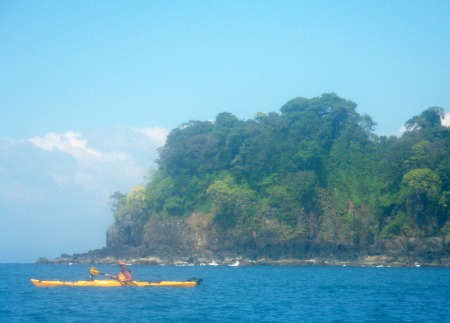
I waited until middle age to buy a sea kayak.
I often paddled directly from my summer home on Lake Superior. I also enjoyed multiple trips in exotic places around the world with my wife.
One of the things which really excited me about living in Panama was the prospect of exploring its coast line by sea kayak. I imported 3 boats from the States, along with paddles, spray skirts and camping gear.
Anyone who comes to visit us, as well as local friends, are dragged out for a trip.
My favourite area is the Boca Chica Islands south of David. I have kayaked to them from Puerto Armuelles. But usually we make the two hour drive from Puerto to Boca Chica for the put in.
From there we paddle 5 or 6 days, self supported, and camping on beaches wherever the mood takes us. The outer islands around Isla Parida have the clearest water for snorkeling, but all are beautiful.
The area is has great rocky headlands, separated by lovely sand beaches. Howler monkeys roar from the jungle and the occasional whale or dolphin can be seen in the ocean.
The land on the Pacific side is public property up to 20 meters beyond the high tide mark. When we camp, we usually we have a beach to ourselves. But when others are around, nobody has ever objected to our presence.
We have to carry our own water, about 5 litres per person per day. We often stock up at the home of a local, if we run low.
While most of my beach landings are gentle, I've had to become very adept at surf landings. Tipping a heavily laden boat and swimming it to shore is exhausting and can wreck the gear.
Before taking visitors on long trips, we usually spend a day at my place in Puerto Armuelles to learn how to control a boat in big waves.
That said, I've taken lots of novices to the protected water of the islands with nothing worse than a few bruised egos to report.
Note from Betsy: Robin & I once kayaked in Puerto Armuelles. Click to read about our paddle. It was a blast. I have always wanted to go again, not sure why I haven't made it happen.
Every trip is different; red sunsets, surprise storms, macaws in the trees above our tents, a fisherman with mariscoes (seafood) for sale, and a mango tree at the campsite.
The companionship of course is always great.
Robin Sare
The free 32 page bi-lingual caroling books are now available in Panama City in all:
Felipe Motta, branches, Casita de Navidad, Crepes and Waffles, Wyndham Hotel Albrook, Restaurant Swiss Chalet, 1985, Avatar Restaurant, Rincon Aleman, Café per Due, Grand Deli, Balboa United Church, St Mary’s New York Bagel, among other retailers, schools, and churches
At the end of each performance, the audience will join the choir in the singing of a favorite Christmas carol.
Saturday, December 12 at 6:60
Mirador Del Pacificoat the fish market end of the Cinta Costera
Santa Claus and his helpers from Casita De Navidad will be there to greet children and pose for photos before the event starts.
To reserve a seat, you need to buy a ticket.
It is free - if you are okay seating on the perimeter. You can get candles at the event.
The cost to reserve a seat is $15, Gold $20, and VIP $25. It includes a souvenir candle which will carry your seat number.
All orders of $20 will be delivered to your Panama City home or office along with song books and candles. You must order soon to get the delivery.
The concert is organized by the CanadaPLUS Foundation.
The foundation holds this event to raise money to aid local charities and institutions.
Beneficiaries this year will be Santo Tomas Hospital and Vision of Hope.
Vision of Hope teaches the blind to make jewelry and to become a functioning part of the community. Samples of their work will be on sale at the event.
The five participating choirs this year are:
- Coro De Opera directed by Paola Cuellar
- Kings College, directed by Vanessa Whay
- The G. Harmony quartet directed by Ricardo Gayle
- Coro JP2 Directed by Danny Gonzalez
- Coro Polifonico Universitario “A Viva Voz” from Chiriqui, directed by Wanda Castillo
The CanadaPLUS Foundation is also helping out with these other events.
December 4, 2016 at 6pm. Hosting a choir for the Hospital Del Nino Christmas Tree lighting ceremony. The foundation will also donate candles to over 200 young patients.
December 11, 2016 at 4 pm. The Chiriqui choir will perform in the lobby of The Wyndham Hotel, Albrook Mall.
A few things to do if you are in Panama City in December.
Have you been to International Living's conferences? One on Panama is coming up on Feb 12-14, 2016 in Panama CityFast-Track Panama: Lifestyle And Opportunity Conference
IL states that they will give you all the information you need to decide if Panama is right for you. They even promise to provide valuable contacts to help you make the move to Panama a success.
I have never been to one of International Living's conferences. Although, I do know people who have, and who enjoyed it. I have been told that their conference is not as over the top enthusiast as their written publications can tend to be.
I won't be at their conference this year either. It is happening during my birthday celebrations. We will be luxuriating somewhere in Panama (exact location is not yet known). Who knows, if you are in the country then we could run into each other. It is a remarkably small country. We seem to run into people we know everywhere we go in Panama.
You can get the conference details on their site by clicking here.
I know the conference is happening soon, probably too soon to make plans to attend. But if it looks interesting to you, you may want to sign up for next year's conference. As I said, I have been told good things about it.
In case you are wondering, I want to be clear, I receive no payment from IL if you attend any of their conferences.
When we had just started poking around to find out where we might want to live, we explored International Living's site and publications alot. Yes, we found its prose a little too rosy at times, but it had alot of good information as well.
If you don't know where in world your next adventure will be, International Living's magazine & website can be inspirational. Just make sure you conduct your own research as well.
At the time of this writing, it is only $49 for one year's worth of magazines. You can cancel anytime.
To be completely transparent, if you sign up - & keep signing up - for the magazine, I make a commission. It doesn't increase your cost at all. Regardless, you should only get the magazine if it adds value to your life.
See the image for the dates. I describe each of the 5 holidays below.
There are parades and festivities galore.
Plan for rain though. November is also the last and often the rainiest month of Panama's rainy season.
Also, with the November holidays, followed by Christmas and then New Years, government offices are often closed from November to early January.
Consequently, it is not the best time of year to quickly get any necessary paperwork acted upon by a government office. You may want to wait until mid-January.
I describe the 5 November holidays, in chronological order, below
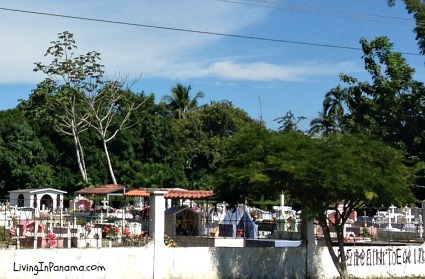
In Panama, the Day of the Dead, or el Dia de los Muertos, is not the huge festive holiday it is in Mexico and some other Latin American countries.
In Mexico, the day of the dead is on November 1 and often extends into the rest of the week.
In Panama, it happens one day later, on November 2nd, and is only celebrated for one day.
It is also officially a dry day. You cannot buy any alcohol in stores or restaurants until after midnight.
On the Day of The Dead, Panamanians visit cemeteries to tidy up and decorate the graves of their loved ones.
Watch out for parades on both Independence & Flag Days in Panama.
This day is also called Separation Day. The day that Panama separated from Colombia.
As you will read, this successful "separation" happened because the US wanted to build the Panama Canal.
In 1903, the US had signed a treaty with Columbia which gave the US the right to build a Canal. The agreement was called the Hay-Herrán Treaty.
Specifically, the treaty granted the US use of the Panama Isthmus to build the canal. In exchange, Colombia would receive financial compensation.
The U.S. Senate ratified the treaty. But the Colombian Senate, fearing a loss of sovereignty, refused.
Understandably, the US was very frustrated over Colombia backing out of the treaty.
In response, President Theodore Roosevelt gave tacit approval to a rebellion by Panamanian nationalists.
These nationalists had recently lost an attempt for Panama independence from Columbia (see the history of their rebellion below).
Given Pres. Roosevelt's "approval", the Panama Canal Company, a French-U.S. corporation formed to build the canal, backed these Panama nationalists.
The Panama Nationalist rebellion started on November 3, 1903.
Unfortunately for Colombia, it had already granted the US management of the railroad on the Panama Isthmus.
Consequently, to help the rebels the US took all the trains off the tracks in Colón. This stranded the Colombian troops that were on their way to crush the insurrection.
The US also sent its warship, the Nashville, to the area which further dissuaded Colombia's army from fighting the rebellion.
It turned out to be a successful and peaceful 3-day rebellion.
Not surprisingly, the brand-new Panama government almost immediately signed a treaty with the US for them to build the canal.
The treaty was negotiated by U.S. Secretary of State John Hay and the owners of the Panama Canal Company.
To be fair, the US didn't create these Panama nationalists. They simply supported them in order to resurrect their Canal deal.
From 1821 - 1903, Panama was part of what was called Gran Colombia. The country of Gran Columbia included modern-day Panama, Colombia, Venezuela, and Ecuador.
In 1821, Panama voluntarily joined Gran Columbia. At the time, it had declared its independence from Spain. They were afraid of Spanish retaliation, so they merged with their stronger neighbor Gran Columbia for protection.
As I mention in my write up of Panama's Independence Day from Spain below, the merger was a mistake. For 80 years Panama experienced neglect and isolation by the Gran Colombian government.
In the mid-1800s, Panama tried and failed 3 times to separate from Colombia.
Then 50 years later, from 1899-1902, a Colombian civil war broke out between conservatives and liberals who wanted to separate from Panama. That war ended only a year before Columbia refused to sign the Canal treaty with the US.
In many ways, the Panama Canal Company didn't need to instigate the rebels. They simply needed to offer aid to the already discontented and defeated liberal leaders of the civil war. And that is what they did.
In exchange, Panama received an initial $10 million, which is the rough equivalent of 285 million in today's dollars.
Then starting 9 years later, Panama received $250,000 annually.
Many Panamanians were not happy with their new leaders signing this deal. They thought of it as an infringement on their country’s new national sovereignty.
So started Panamanians efforts to rescind the treaty.
For decades there were protest and negotiations, with Panamanians demanding control of the Canal.
Finally, as most of you know, Panama gained control over the Panama Canal in December 1999.
What finally happened to cause the US to lose control of the Panama Canal?
It was the pivotal protest on what is now called Martyr's day.
Read my post about Panama's Martyrs Day riot by clicking here.
Most towns in Panama will have a parade to celebrate independence day. (And another on Nov 4th for Flag Day, see below)
The Drumming May Drive You Crazy
For months leading up to these parades, you will hear the school children practicing the snare drum and xylophones. Most schools can only afford those 2 instruments. At the parade, you will see school after school march by playing those instruments, more or less well.
In Puerto Armuelles, we have one school, ESPA, that thankfully has a full band that marches too. They are an excellent band and make good relief to all those xylophones and drums.
In yet another show of sexism in Panama, you will notice that only boys are playing the drums and only girls are playing the xylophones. I have never seen it otherwise.
You will also see police and fire officers marching in full dress uniform.
Like Day of the Dead and most Panama Holidays, you can not buy alcohol from stores and restaurants on Independence Day.
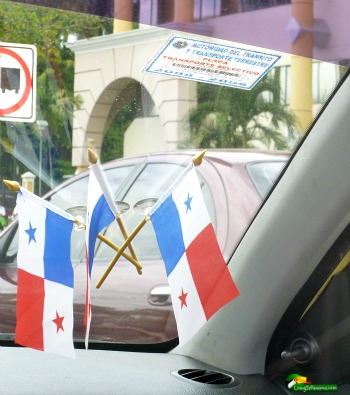
You will see the Panamanian flag waving and hanging everywhere on Flag day.
Flags are displayed on banks, businesses, overpasses, car antenna, anything that can be decorated with a flag.
Originally striped in red and yellow, the Panama flag soon looked like it does today.
Blue - symbolizes purity and honesty
Red - represents authority and law
White - symbolizes peace
Alternative design significance
Other people say the stars on the flag represent the country’s opposing political parties – blue for the conservative party and red for the liberal party – and the white background represents a goal of working together in peace.
1st Cry of Independence from Spain
The uprising of Villa de Los Santos is known as the first cry of independence from Spain. (Primer Grito de Independencia de Espana)
From the early 16th century and into the 19th century, Panama was an important colony for the Spanish Empire.
Panama City's port was particularly useful. The port was ideal for shipping all of the treasures and resources that the Spanish plundered from throughout Latin America.
The Spanish governors were not kind or just to the locals. One day the citizens of the small town of La Villa de Los Santos had had enough.
A Letter is Written To Rebel Simon Bolivar
On November 10, 1821, concerned villagers wrote a letter to Simon Bolivar. Simon Bolivar was an important revolutionary hero throughout Latin America. He was also the President of Gran Colombia. (He was President from 1819 to 1830.)
The letter complained about the Spanish governor and asked Bolivar for revolutionary assistance.
Though not officially the date of independence from Spain, this day pushed the process full-steam ahead.
This day is primarily celebrated in the town of La Villa de Los Santos. They have a parade, of course, which starts on Simón Bolívar Street.
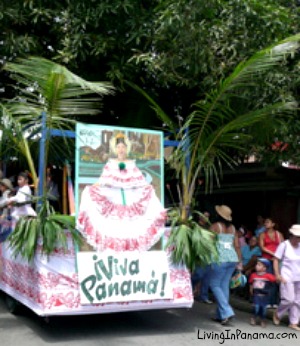
On November 28, 1821, 18 days after Primer Grito de Independencia, the uprising of Villa de Los Santos, an open town meeting occurred in Panama City.
At this historic town meeting, it was decided that Panama would declare independence from the Spanish empire.
Join Gran Columbia
Then they got nervous. Afraid that the Spanish Armada would attack. Panama decided to join its stronger neighbor, Gran Colombia.
This turned out to be a costly decision.
What followed were years of neglect and isolation by the Colombian government.
80 years later, on Nov 6. 1903 Panama also gained independence from Colombia. A day that is celebrated on Nov. 3rd, the day the 3-day rebellion began.
Panama is blessed with gaining its independence from Spain, Colombia, and the US all with a relative lack of violence.
October 31, 2015
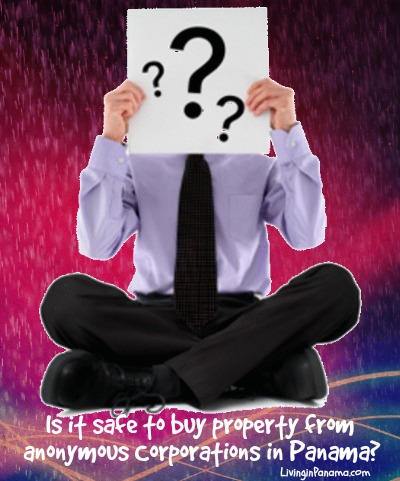
Buying within a Sociedad Anonima shields the party from legal suit.
What this can mean is that the person that the innocent party was negotiating with, the one they met, got to know, and shook hands with, is never seen after the document is signed. That person is was quickly replaced by a powerful Panamanian lawyer, who is the agent or officier for that corporation.
This can be fine, as long as everything goes smoothly. However, if there are some disagreements down the road, or if the intent from the start was to defraud, the innocent expat will discover that he/she is at a tremendous disadvantage, as an individual when facing off against a Panamanian corporation.
Our advice to expats is simply this: Don’t ever sign any documents for purchase or for sale with an anonymous corporation, or with a buyer or seller who has plans to transfer documents to a corporation before all payments have been made, received, and signed that individual.
You do not ever (never, ever) want to find yourself in court, as an individual, facing charges, or trying to seek damages against a corporation.
The person you thought you were doing business with may disappear completely, or they may claim that they have never met you, don’t know what you are talking about, and that everything you are saying is untrue. That person could even sue you for slander for accusing them of something that is absolutely true. Then you’d be involved in two separate lawsuits.
Meanwhile, the seller, or his corporation, may be represented by one of the wealthiest, best-connected lawyers in Panama. A lawyer who may be working overtime to cheat you out of every cent you have invested in Panama. This is not a pleasant prospect.
Never sign a contract with a Panamanian corporation. This is a risk that you do not have to take. Instead, do the following: If there is a property that you are interested in, and it is being held by a Panamanian corporation, have the owner sell it to himself first. Then he can sell it to you.
At least this way you are both being completely transparent, and you face the same risks. This “leveling of the playing field” will keep your business dealings much friendlier. If the seller, or buyer, is unwilling to transfer the property to himself first, he probably wasn’t someone that you should be doing business with. You are better off. Let someone else take the risk.
Many expats are encouraged to establish their own corporations in Panama, even if only to create an umbrella agency for managing their home, their car, any investment properties, etc. The notion is that this is the best way to safeguard oneself, and one's family, from legal repercussions in the event of some unseen “event” in which they might be found legally at fault, and be sued in court. I think that this notion is promoted primarily by Panamanian lawyers, who are always looking for another way to charge expats a couple of grand. Our family does own a couple of corporations in Panama. But we do not see them as the absolute safeguard that others may.
The notion of running one’s entire life in Panama as if you are actually just a mere shareholder in a corporation, instead of an individual, has been touted as the best way to stay out of trouble. This is certainly the idea behind corporations in the US. We all know stories of friends or acquaintances in the US who have lost their shirts investing with an LLC that declared bankruptcy. Meanwhile, the actual people involved in the corporation didn’t lose a penny of their own assets.
Here in Panama, the formation of private corporations has been taken one step further. Unscrupulous US citizens, drug dealers, and smugglers have historically been able to hide the movement of their assets behind a “front” of their various corporations, in an attempt to defraud the Internal Revenue Service.
I cannot say how effective this has been for all investors who follow this practice. However, since Panama is such a small country, and since news travels so quickly here by word of mouth, as well as by internet, it is really quite easy to see which expats are managing their real estate portfolios, in particular, under the name of one or more corporations. There is one investor in our town who has each of his numerous properties registered as a separate corporation. I seriously doubt if this will decrease his tax liability in the US. In fact, I wouldn’t be surprised if any his attempt of his to do so, landed him in jail.
It is no secret that the IRS has recently increased its scrutiny of US expats living in Panama and in other nations considered to be “tax havens”. It is just a matter of time before tax evaders are found out, and brought to justice in the US. In fact, there have been reports of unscrupulous Panamanian lawyers actually turning in their own clients to the IRS for a hefty reward. If part of your interest in investing in Panama is to evade paying your US tax bill, our opinion is that this is a very risky proposition.
For more information on related topics, check out these posts: